Crawling Back: Amazing Spider-Man #1 Review
Lee and Ditko follow up Spidey's origin issue with a new series, exploring the choices faced by a superhuman teenager
—by Nathan on February 18, 2024—
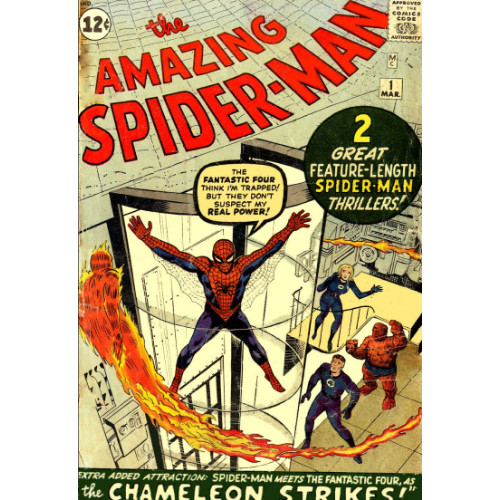
About half a year after his amazing, fantastical debut, Spider-Man hit the newsstands again.
Or wherever they sold comics in 1963.
Born within the dying embers of a comic series slated for the chopping block, Peter Parker's superpowered alter ego took readers by storm; according to the first page of the first issue of his first ongoing series, "So great was your response via letters and postcards, that it was decided to give him his own magazine!" And thus Spider-Man joined the ranks of other celebrated Marvel heroes such as the Fantastic Four and the Incredible Hulk in receiving his first ongoing series: The Amazing Spider-Man!
As I recently surveyed the origin of a somewhat different Spider-person also given his own series (albeit thirty years after this one), I thought an analysis of the first issue of Amazing Spider-Man would pair well. Spidey may not have been the first Marvel hero with a series named after him, but he's had greater longevity than most. ASM has been going strong these past 60 years, and despite editorial upheavals and occasional questions of quality, has been the primary title our hero's swung through. There's a reason it served as the name of a two-film franchise (other than, obviously, not wanting to just have "Spider-Man" again). The book is currently creeping towards its 1000th issue, and though it may take some time to reach that milestone, why not take a moment to reminisce on the series' fabled origins and celebrate our hero's humble beginnings?
"Spider-Man"/"Spider-Man vs. The Chameleon"
Writer: Stan Lee
Penciler: Steve Ditko
Inker: Steve Ditko
Colorist: Stan Goldberg
Letterers: John D’Agostino, John Duffy
Issue: Amazing Spider-Man #1
Issue Publication Date: March 1963
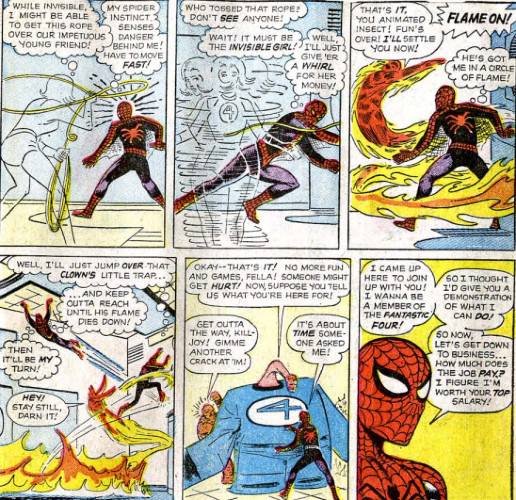
The issue opens essentially where we left Peter at the end of Amazing Fantasy #15, in a state of despair even after catching his uncle's killer. Putting the thug responsible behind bars does little to assuage Peter's feelings. Oddly, Lee only notes that Ben was murdered by a burglar, Peter blaming his own showboating, as if he could have stopped the burglar otherwise. Lee fails to mention Peter's the one who let the crook get away, undermining the impact of the whole "With great power…" bit he'd just established. Let's blame Lee's seemingly faulty memory. This is the guy who calls our hero "Peter Palmer" later in this same issue, once thought Flash Thompson was named "Moose," had Doc Ock call Spidey "Superman" during their first encounter, and initially called Cyclops "Slim Summers."
From the get-go, Peter is presented as this tortured figure. He struggles earning money as Spidey because he doesn't want to reveal his true identity and banks won't take checks cashed by "Spider-Man"; he can't even get a job as Peter Parker (though Lee and Ditko would resolve that point the very next issue); he punches a wall in frustration when he sees his Aunt May pawning some of her possessions for the money necessary to pay their rent. Here's this young man, with all this intelligence and incredible power, and what can he do with it? The line between his identities is drawn, thick and quickly. It's established almost immediately that these two sides of Peter Parker cannot collide–Peter can't use his Spidey persona to directly make circumstances better for the Parkers, nor can Spidey rely on his Peter Parker identity to avoid the inevitable public ridicule he faces when J. Jonah Jameson begins to go clickity-clakcity on his typewriter, espousing all manner of hatred towards the hero. Yes, Spidey briefly mentions to his promoter that "No one must know my identity!" but this feels more aligned with his reasoning in his inaugural issue: he's a kid, a very bookwormish kid, and the independence he feels as a costumed character would be ruined were the world to know his identity. We've not quite reached the point where Peter is terrified that some villain who learns his identity will threaten his loved ones.
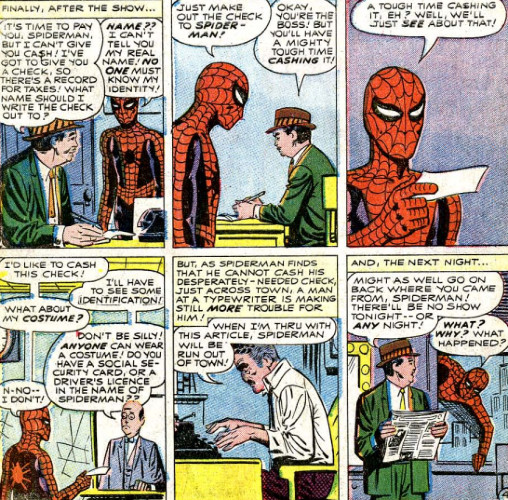
Which leads to a point Lee and Ditko toy with: who Spider-Man is as a character. The first time Spidey saves an individual, Jameson's son John, is almost a fluke. Peter's in the area when John's space capsule goes awry, and our hero decides he's the only person capable of rescuing John; it's only after he saves the astronaut that he hopes the action will put him on the good side of the Daily Bugle publisher. This isn't the "I'm gonna swing around the city as part of a routine" Spidey yet. He's not fully indoctrinated himself into the superhero game. If anything, he's more interested in making money off his costumed identity, despite the hurdles. It's why he attempts to join the Fantastic Four in the issue's second half, telling them he's "worth [their] top salary" after an impressive display of his superhuman strength and senses…and it's why he leaves, dejected, after learning they're a non-profit. He has the power, but he's still learning about the responsibility.
Lee and Ditko tug at this strand, revealing the reluctance in Peter to perform as Spider-Man for the safety and betterment of those around him. There's never a "Guess I’m a superhero" moment, no lightning bolt of epiphany, no single second of clarity where Spidey determines this is his fate from that moment forward. He consistently contemplates his worth as a superpowered individual, particularly when surrounded by Jameson's hate. He's called a menace, people believe he's a publicity stunt, even Aunt May thinks he's "horrible." His well-intentioned actions are misconstrued...though, to be fair, Lee and Ditko have him web up a fair share of security people, perhaps hinting at a bit of childish naivety. When the costumed communist the Chameleon frames him for a crime, Spidey inadvertently leads the cops right to him and then runs into an alleyway, "wish[ing] [he] had never gotten [his] super powers!" not realizing he's accidentally cleared his own name. He's crying at this point, a poor kid completely lost in a world turned against him.
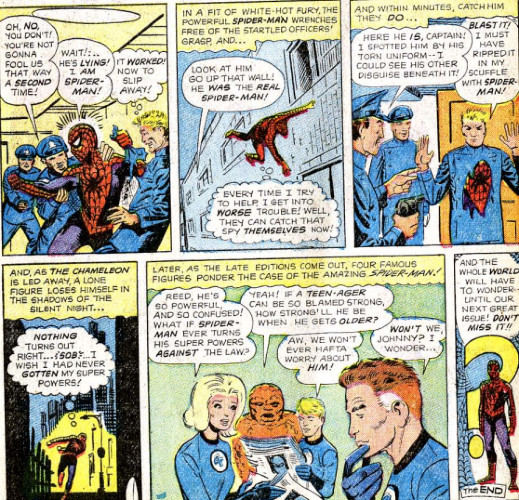
I'm often negative towards this type of writing. If I were reading these issues for the first time now, I'd probably berate Lee for throwing Spidey against everybody and creating tension with all the subtlety of a train crash. I'd question Jameson's hatred towards Spidey and the incredibly easy way in which he gets the public (read: basically every human being Spidey comes into contact with) to turn against our hero. Surprisingly, I don't feel that way…question mark? I do somewhat question Jonah's motivations at this point, but I understand the need for Spidey to have a vocal antagonist, even if Lee and Ditko aren't supremely adept at indicating the cruel irony of a blustering madman ripping into the self-esteem of a teenager who's uncle was recently murdered. We do get a sense Jameson's hatred is deeper than just "This Spider-Man is a bad role model to our children" and contains a slight personal edge (how dare that publicity hound steal the spotlight from his brave, daring son!) but that may be hindsight talking, knowing the kind of character Jameson becomes. A bit of humor can be found in Jonah's blustering, as by stirring up so much fear-mongering against Spidey, he draws attention away from his son's exploits.
Multiple bits of sparse theming are woven throughout this issue, and it's engaging to watch the intriguing notions which are hinted at yet not thoroughly explored. We get a lot of Peter's angst (maybe a bit too much angst), but other ideas linger around the fringes: Jonah's extremist views towards Spidey and why the public turns so quickly (JJJ contends that Spidey's a malcontent and an unsuitable inspiration for the youth); Jonah's relationship with his son, which has a few nice bits (Jonah is relieved that his son is safe, and here, the irony of him then lambasting the man who saves John is not lost on the reader) and turns Jonah into more than a one-note hate-monger, yet leaves me wondering why John just doesn't tell his dad "Don’t hate on the dude who saved me"; Peter's somewhat naive methods of handling tense situations, which could actually offer credence to Jonah's ranting if looked at a certain way. All of these are blended together, and though they work well together in unison, we're not allowed the space to ponder such concepts individually.
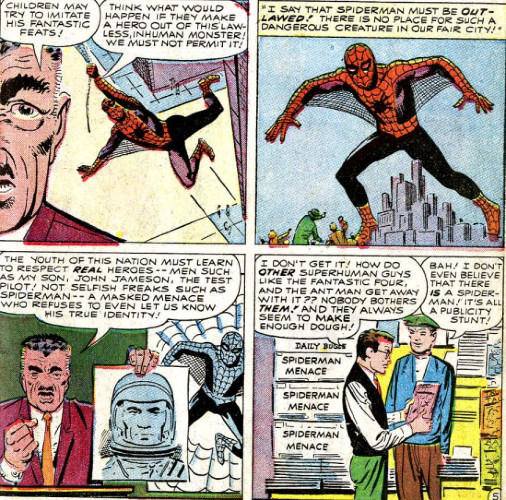
One notion which Lee and Ditko do ponder a tad deeper is Peter's agency. Tension ripples across the pages as Peter and others constantly worry about the kind of person he may become, with the concern floating through the story that he'll begin utilizing his abilities for selfish, nefarious reasons. Peter realizes early on that he could gain whatever resources he and Aunt May need, and he's haunted by the prospect that circumstances may force him into becoming the menace people already fear he is. Lee constructs the idea as one of fate, not that Peter would willingly become a menace to prove something to the masses which ostensibly hate him, but that all other opportunities would be cut off from him and leave him with no other choice.
I don't recall if this idea is ever utilized by Lee in additional issues; by time ASM #2 rolls around, it seems pretty clear from Peter's conflicts with the Vulture and the Tinkerer that he'll be the superhero the people of New York need him to be, even if they don't want him. So the concept of Peter turning to a life of crime never gains much traction…still, it becomes an intriguing thought exercise, allowing Peter a hint of duality not seen in other heroes. Though briefly used, Peter's reluctance is important for Lee and Ditko to take some extra time to establish the teen's heroic credentials. There's some nice reason played into Peter's choices as he considers the practical applications of his abilities. As his powers don't seem to offer financial gain through legal means (just yet), how else is he supposed to use them other than to help or harm folks? Adding even a thin layer of indecision creates a more compelling character: you're not just reading to see who Spidey socks in the jaw every month; you're reading to see the choices Peter makes in how he'll use his abilities.
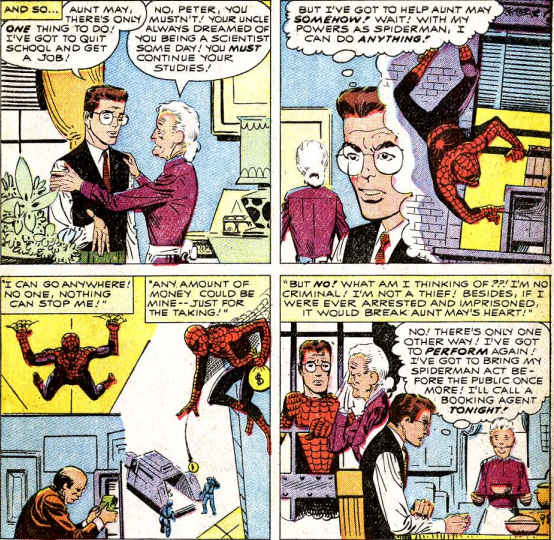
We're left with a surprisingly torn teenager, reeling from the events of his origin issue and doing his darndest to determine how he's going to navigate these new abilities. Who will he become? The scale teeters, dipping towards the dark side briefly, tension stirred in the reader by the concerns of a worrying public. We don't wait long until we realize that, yes, Peter is willing to utilize his powers responsibly. Where else was the series going to go? But those moments of tension, even if they don't create doubt, still allow Peter the necessity of growth during this transitional period as he embraces what could only be referred to as "destiny." We may know who he becomes, but at this stage, he doesn't, and neither do Aunt May, the Fantastic Four, or his less than adoring public. Jameson may have him pegged, and the Chameleon may hope to use Spidey's bad publicity to his advantage, but we see how Spidey rises against the odds thrown his way. "Wealth and fame he's ignored," as the classic song goes. But that same tune ends on a powerful note: "Wherever there's a hang-up, you'll find the Spider-Man." And this issue, though overly melodramatic at moments, reinforces that Spidey will be there for the folks who need saving, even if they're not there for him.